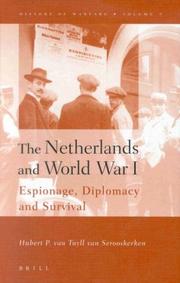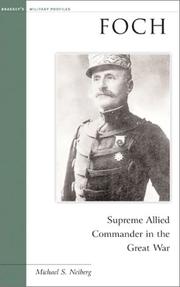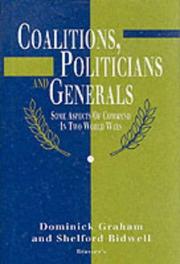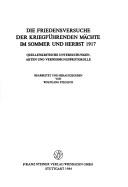| Listing 1 - 10 of 13 | << page >> |
Sort by
|

ISBN: 9004122435 9004475621 9789004122437 9789004475625 Year: 2001 Volume: 7 Publisher: Leiden;Boston BRILL
Abstract | Keywords | Export | Availability | Bookmark
 Loading...
Loading...Choose an application
- Reference Manager
- EndNote
- RefWorks (Direct export to RefWorks)
During World War I the Netherlands was situated squarely between two warring great powers, Britain and Germany, and on the edge of the war zone itself. Isolationism was impossible; strict neutrality was inadequate. The Netherlands nevertheless escaped the war, mainly because of its own actions. This book is the story of the people who managed this escape. The first part of the book examines the pre-war situation, espionage against Germany, and the mobilization of 1914. Succeeding chapters cover the military-diplomatic balancing act during the war, the attempted revolution of 1918, and the near-disaster at Versailles. The book concludes with a consideration of major issues. This work is intended to appeal to a broad audience, including students of World War I, modern European history, diplomatic history, military history, and peace studies.

ISBN: 1612340571 9781612340579 1574885510 9781574885514 Year: 2003 Publisher: Washington, D.C. Brassey's
Abstract | Keywords | Export | Availability | Bookmark
 Loading...
Loading...Choose an application
- Reference Manager
- EndNote
- RefWorks (Direct export to RefWorks)
Analyzes the career of one of France's greatest military heroes and examines the contentious postwar Versailles Conference of 1919
Command of troops. --- Foch, Ferdinand, 1851-1929. --- Leadership. --- Marshals -- France -- Biography. --- World War, 1914-1918 -- Campaigns -- Western Front. --- World War, 1914-1918 -- Diplomatic history. --- Marshals --- World War, 1914-1918 --- Leadership --- Command of troops --- Campaigns --- Diplomatic history --- Foch, Ferdinand,

ISBN: 1857530071 Year: 1993 Publisher: London New York NY Brassey's (UK) Distributed in North America to booksellers and wholesalers by the Macmillan
Abstract | Keywords | Export | Availability | Bookmark
 Loading...
Loading...Choose an application
- Reference Manager
- EndNote
- RefWorks (Direct export to RefWorks)
Book
ISBN: 9789085424130 9085424135 Year: 2013 Publisher: Amsterdam: De Bezige Bij,
Abstract | Keywords | Export | Availability | Bookmark
 Loading...
Loading...Choose an application
- Reference Manager
- EndNote
- RefWorks (Direct export to RefWorks)
History of Europe --- anno 1910-1919 --- anno 1900-1909 --- World War, 1914-1918 --- Causes --- Diplomatic history --- Europe --- History --- Politics and government --- World War, 1914-1918 - Causes --- World War, 1914-1918 - Diplomatic history --- Europe - History - 1871-1918 --- Europe - Politics and government - 1871-1918
Book
ISSN: 11574488 ISBN: 9782746735569 2746735563 Year: 2014 Publisher: Paris: Autrement,
Abstract | Keywords | Export | Availability | Bookmark
 Loading...
Loading...Choose an application
- Reference Manager
- EndNote
- RefWorks (Direct export to RefWorks)
Récit du cheminement de l'Europe vers la Première Guerre mondiale. L'historienne canadienne, professeur à Oxford, met en lumière les occasions manquées de maintenir la paix, le rôle moteur des ressentiments nationalistes, le prétexte des rivalités coloniales et des enjeux balkaniques, les maladresses commises par certains dirigeants politiques.
World War, 1914-1918 --- Première guerre mondiale --- Causes --- Triple Entente, 1907 --- History, Modern --- Diplomatic history --- Europe --- Politics and government --- World War, 1914-1918 - Causes --- World War, 1914-1918 - Diplomatic history --- History, Modern - 20th century --- Europe - Politics and government - 1871-1918
Book
ISBN: 9781623561802 9781623560737 162356073X 1623561809 Year: 2014 Publisher: New York: Bloomsbury academic,
Abstract | Keywords | Export | Availability | Bookmark
 Loading...
Loading...Choose an application
- Reference Manager
- EndNote
- RefWorks (Direct export to RefWorks)
"The text aims to uncover the roots of the United States' near perpetual involvement in war since the beginning of WWI in 1914. Using alliance politics as the main framework of analysis, it offers a new interpretation that contrasts with the traditional views that war is an interruption of the American foreign policy emphasis on diplomacy. Instead, it posits that war has been the norm during the past century while peaceful interludes were but a time of respite and preparation for the next conflict. After a thorough discussion of the concepts of alliance building and the containment doctrine, the work then addresses such themes as the alliance networks used to confront German and Japanese powers during the early 20th century wars, the role of alliances in containing the Soviet Union during the Cold War, the creation of alliances to restrict and defeat rogue state powers, and whether they were useful when dealing with the challenges posed by terrorism in the post-9/11 world. Each chapter features case studies, a summary, references, and web links. In addition, the book utilizes primary sources, such as U.S. Department of Defense and State documents and presidential statements. An exhaustive study of containment and alliance, this text will be an essential resource for anyone studying U.S. foreign policy, international relations, and national security"--
Alliances --- Alliances (Politique) --- Allianties --- World War, 1914-1918 --- World War, 1939-1945 --- Cold War --- Diplomatic history --- United States --- History, Military --- Foreign relations --- History [Military ] --- 20th century --- 21st century --- World War, 1914-1918 - Diplomatic history --- World War, 1939-1945 - Diplomatic history --- Cold War - Diplomatic history --- United States - History, Military - 20th century --- United States - History, Military - 21st century --- United States - Foreign relations - 20th century --- United States - Foreign relations - 21st century

ISBN: 3515024557 9783515024556 Year: 1984 Volume: 4 Publisher: Wiesbaden: Steiner,
Abstract | Keywords | Export | Availability | Bookmark
 Loading...
Loading...Choose an application
- Reference Manager
- EndNote
- RefWorks (Direct export to RefWorks)
World War, 1914-1918 --- Première guerre mondiale --- Peace --- Sources --- Diplomatic history --- Paix --- Histoire diplomatique --- -World War, 1914-1918 --- -940.3/.4 --- 940.4 --- European War, 1914-1918 --- First World War, 1914-1918 --- Great War, 1914-1918 --- World War 1, 1914-1918 --- World War I, 1914-1918 --- World War One, 1914-1918 --- WW I (World War, 1914-1918) --- WWI (World War, 1914-1918) --- History, Modern --- -Sources --- Première guerre mondiale --- 940.3/.4 --- Diplomatic history&delete& --- Peace&delete& --- World War, 1914-1918 - Peace - Sources --- World War, 1914-1918 - Diplomatic history - Sources
Multi
ISBN: 9781108475303 9781108466684 9781108566711 1108475302 1108466680 1108688632 1108566715 1108618405 9781108618403 9781108688635 Year: 2019 Publisher: Cambridge Cambridge University Press
Abstract | Keywords | Export | Availability | Bookmark
 Loading...
Loading...Choose an application
- Reference Manager
- EndNote
- RefWorks (Direct export to RefWorks)
"When the Germans requested an armistice in October 1918, it was a shock to the Allied political and military leadership. They had been expecting, and planning for, the war to continue into 1919, the year they hoped to achieve a complete military victory over the Central Powers. Meighen McCrae illuminates how, throughout this planning process, the Supreme War Council evolved to become the predominant mechanism for coalition war-making. She analyses the Council's role in the formulation of an Allied strategy for 1918-1919 across the various theatres of war and compares the perspectives of the British, French, Americans, and Italians. In doing so we learn how, in an early example of modern alliance warfare, the Supreme War Council had to coordinate national needs with coalition ones."--Provided by publisher
World War, 1914-1918 --- Military planning --- Supreme War Council --- --Guerre mondiale, 1re, --- Planification militaire --- --Europe --- --XXe s., --- History --- Diplomatic history --- Allied and Associated Powers (1914-1920). --- Polemology --- World history --- anno 1910-1919 --- Europe --- Military planning - Europe - History - 20th century --- World War, 1914-1918 - Diplomatic history --- Guerre mondiale, 1re, 1914-1918 --- XXe s., 1901-2000 --- World War, 1914-1918. --- Diplomatic history. --- War planning --- Military administration --- Military policy --- Planning --- European War, 1914-1918 --- First World War, 1914-1918 --- Great War, 1914-1918 --- World War 1, 1914-1918 --- World War I, 1914-1918 --- World War One, 1914-1918 --- WW I (World War, 1914-1918) --- WWI (World War, 1914-1918) --- History, Modern
Book
ISBN: 0674033906 9780674033900 9780674725775 0674028392 9780674028395 0674725778 9780674028395 Year: 2013 Volume: 162 Publisher: Cambridge, Massachusetts
Abstract | Keywords | Export | Availability | Bookmark
 Loading...
Loading...Choose an application
- Reference Manager
- EndNote
- RefWorks (Direct export to RefWorks)
In an illuminating study that blends diplomatic, military, technology, and business history, Jonathan Reed Winkler shows how U.S. officials during World War I discovered the enormous value of global communications. At the outbreak of war in 1914, British control of the cable network affected the Americans' ability to communicate internationally, and the development of radio worried the Navy about hemispheric security. The benefits of a U.S. network became evident during the war, especially in the gathering of intelligence. This led to the creation of a peacetime intelligence operation, later termed the "Black Chamber," that was the forerunner of the National Security Agency. After the war, U.S. companies worked to expand network service around the world but faced industrial limitations. Focused on security concerns, the Wilson administration objected to any collaboration with British companies that might alleviate this problem. Indeed, they went so far as to create a radio monopoly and use warships to block the landing of a cable at Miami. These efforts set important precedents for later developments in telephony, shortwave radio, satellites-even the internet. In this absorbing history, Winkler sheds light on the early stages of the global infrastructure that helped launch the United States as the predominant power of the century.
World War, 1914-1918 --- National security --- Strategy --- Communication, International --- Communication in politics --- History & Archaeology --- History - General --- Diplomatic history. --- History --- Communications. --- Diplomatic history --- Communications --- United States --- Foreign relations --- Political communication --- International communication --- World communication --- European War, 1914-1918 --- First World War, 1914-1918 --- Great War, 1914-1918 --- World War 1, 1914-1918 --- World War I, 1914-1918 --- World War One, 1914-1918 --- WW I (World War, 1914-1918) --- WWI (World War, 1914-1918) --- Military strategy --- Political science --- Communication --- History, Modern --- Military art and science --- Military doctrine --- World War, 1914-1918 - United States --- World War, 1914-1918 - Diplomatic history --- National security - United States - History - 20th century --- Strategy - History - 20th century --- World War, 1914-1918 - Communications --- Communication, International - History - 20th century --- Communication in politics - United States - History - 20th century --- United States - Foreign relations - 1913-1921 --- History.
Book
ISBN: 8487661696 9788487661693 Year: 1995 Volume: 3 Publisher: Madrid: Ministerio de asuntos exteriores,
Abstract | Keywords | Export | Availability | Bookmark
 Loading...
Loading...Choose an application
- Reference Manager
- EndNote
- RefWorks (Direct export to RefWorks)
History of Belgium and Luxembourg --- History of Spain --- anno 1910-1919 --- World War, 1914-1918 --- Neutrality --- Diplomatic history --- Spain --- Foreign relations --- Politics and government --- -World War, 1914-1918 --- -European War, 1914-1918 --- First World War, 1914-1918 --- Great War, 1914-1918 --- World War 1, 1914-1918 --- World War I, 1914-1918 --- World War One, 1914-1918 --- WW I (World War, 1914-1918) --- WWI (World War, 1914-1918) --- History, Modern --- Neutralism --- International relations --- Buffer states --- Intervention (International law) --- Isolationism --- Nonalignment --- Prize law --- Region of war --- Unneutral service --- War, Maritime (International law) --- War (International law) --- Sources --- -Sources --- Law and legislation --- -Spain --- -Foreign relations --- -Espanja --- Spanien --- Hiszpania --- Spanish State --- España --- Estado Español --- Espagne --- Hispania --- Sefarad --- Sepharad --- Shpanye --- Shpanie --- Reino de España --- Kingdom of Spain --- Reino d'Espanya --- Reinu d'España --- Espainiako Erresuma --- Regne d'Espanya --- Reiaume d'Espanha --- Espanya --- Espanha --- スペイン --- Supein --- イスパニア --- Isupania --- European War, 1914-1918 --- Diplomatic history&delete& --- Espanja --- Sources. --- Geschiedenis van Spanje --- Geschiedenis van België en Luxemburg --- World War, 1914-1918 - Spain - Sources --- World War, 1914-1918 - Diplomatic history - Sources --- Neutrality - Spain - Sources --- Spain - Foreign relations - 1886-1931 - Sources --- Spain - Politics and government - 1886-1931 - Sources
| Listing 1 - 10 of 13 | << page >> |
Sort by
|

 Search
Search Feedback
Feedback About UniCat
About UniCat  Help
Help News
News